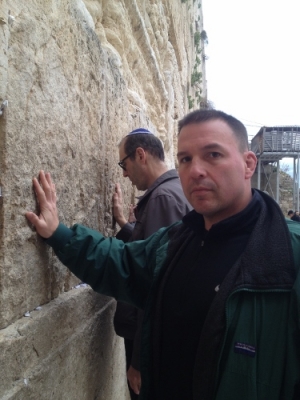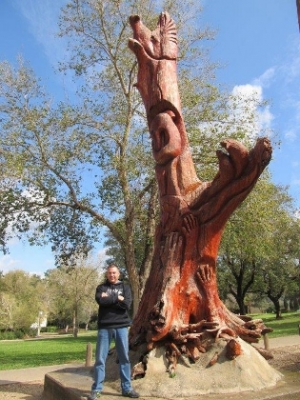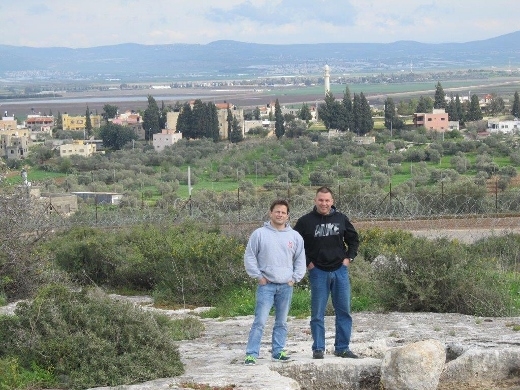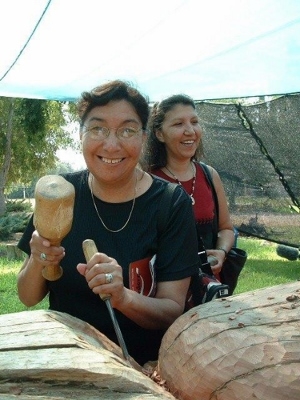Top Canadian Cop in Visit to Givat Haviva
Story and Photos: Lydia Aisenberg
Dwayne Zacharie, a recent visitor to Givat Haviva, may not be the only member of Canadian First Nations to have paid a call to the Wadi Ara campus – but he is definitely the only First Nations Chief of Police so far.
In 2003, a group of First Nations teachers, who had been brought to Israel by Bnai Brith Canada, visited Givat Haviva Educational Institute following a week-long seminar at Yad Vashem in Jerusalem.
They had come to Givat Haviva to meet Warsaw Ghetto survivor, Yurek Plonsky, at Moreshet (The Mordechai Anielevicz Memorial Holocaust Study and Research Center) situated on campus.
Following their emotional meeting with Yurek, the First Nations educators were invited by a group of Jewish and Arab youth working on an art project on the main lawn to join them for a few minutes before continuing on their journey north.
The few minutes became more like an hour of very interesting, productive and creative interaction as the group of Jewish and Arab teens were sculpting the Givat Haviva Peace Tree from a 100-year-old "felled-by-a-storm" eculyptus tree.
The First Nations visitors strongly identified with the project, although it took the teens a while to explain that it was not a totem pole they were creating, but a peace tree. Invited to join in physically, the visitors were given chisels and mallets and were delighted to leave a deep mark (and more) not only on the Givat Haviva campus, but also on the Peace Tree itself.
Unlike the First Nations educators, Police Chief Dwayne Zacharie, 45, was on a private visit to Israel – his first – and was accompanied by close friend and former wrestling partner, Dr. David Mendelsohn, a social linguist, archaeologist and former member of the Givat Haviva academic staff, who maintains very close ties with the organization.
How a Jewish and Mohawk teen became friends for life is an amazing story in itself.
David Mendelsohn was brought up in an ultra-orthodox family in Montreal but in his early teens decided he didn't want to be religious and went to stay at Kahnawake, where he became friendly with Dwayne.
Extremely accomplished wrestlers, they both became members of the Canadian National team between 1986 and 1997 and are still involved in the sport today.
Among the many languages spoken by David, who teaches ancient Greek and Middle East history at Kivunim, one of the most prestigious year courses for overseas students in Israel, is that of the Mohawk.
The secretary and treasurer of the First Nations Chiefs of Police Association, Dwayne has worked for the Kahnawake Peacekeepers since 1997 and is currently the Chief Peacekeeper responsible for the administration of all policing functions.
In 2013 he was elected president of the First Nations Chiefs of Police Association of Quebec, their main role being capacity building in order to raise the standards of policing services offered to Native communities.
"Our primary service is law enforcement within the Territory, mostly focusing on safety, protection and accountability," explained Dwayne, who has 33 peacekeepers serving under him at Kahnawake where First Nations peacekeepers wear their own special uniforms but have all the rights of Canadian police. "For instance, if I was in Montreal, I could make an arrest in the same way as one of the local police," said Dwayne.
Kahnawake has more than 10,000 residents and is a very close-knit community. While they welcome guests, they do not allow for non-First Nations to live there permanently , even if they marry someone who already lives there.
The total Mohawk population living in a number of large and small communities is around 80,000. The nearest community to Kahnawake is Akwesasne, an hour and a half's drive away, where 15,000 Mohawk reside. Although some people refer to the Mohawk communities as 'reserves', Dwayne said this is not an acceptable term. "We are a community," he stated emphatically.
Following their visit to Givat Haviva, David and Givat Haviva, David and Dwayne accompanied me on a vist to Barta'a village and then to Kibbutz Mishmar HaEmek.
During the conversation about the kibbutz community and acceptance according to a process of a lengthy procedure and being voted in by the membership, Dwayne further elaborated about what was and what was not acceptable at Kahnawake, which translates to "by the rapids".
On the issue of non-First Nations being able to permanenly settle in the community, Dwayne explained that the children of a mixed-couple (who would have to live outside the community), would be allowed to build a home at Kahnawake as they would "have Mohawk blood".
"We have a very structured society, matriachal actually, with the women playing a huge role in everything. We also have a lot of politics," he quipped.
Dwayne's father worked for the Ministry of Indian Affairs and was also a private businessman.
"My father served in the US Army and in the main there is a lot of ignorance about native Americans. For instance, men from our community fought in the Second World War, Korea, Vietnam and Afghanistan. My own father served in Korea and Vietnam."
Asked about how he is viewed by his community for choosing a career in law enforcement, Dwayne was brutally honest.
"There is a stigma attached to policing, and it is certainly not seen as a natural career path. I now have to enforce the laws of Canada, which the Mohawk recognize but do not accept.
"They say Canada has oppressed us and so why are you enforcing their law in our community instead of allowing us to handle these matters ourselves.
"David and I have been planning my visit to Israel for decades and I have to say that it has been very interesting. I now realize how similar the Israeli and Palestinian conflict was to First Nations people's fight for land and self-determination, although David and I never discussed it before this trip.
"Following our visit to Givat Haviva, Barta'a and the Wadi Ara region with our guide, Lydia, it became apparent that there were similarities, and we had some discussions about the different perspectives. All in all it has been a great experience and I cannot wait to come back again," he said.
"We really have been planning this visit to Israel since we were teens," added David Mendelsohn. "Issues such as the deep connection a First Nations Mohawk feels for his native soil and the Israeli and Palestinian conflict over land were never considered or discussed and our visit to Givat Haviva and the day we spent exploring the Wadi Ara region proved to be extemely important and enlightening.
"It created the opportunity to consider and discuss issues of ancestry and expulsion from one's native land from the perspectives of First Nations People, Jews and Arabs."











Comments